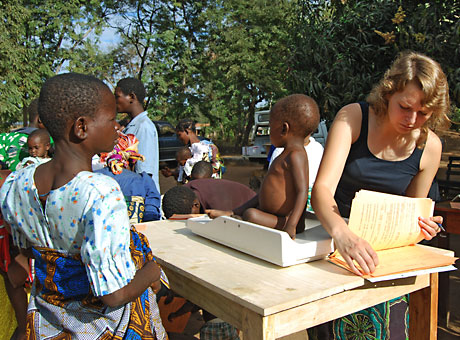
Second-year medical student Rachel E. Amthor, a Washington University Ann W. Olin Women’s Fellow, works in Malawi on Project Peanut Butter, an effort to end malnutrition in children.

Second-year medical student Rachel E. Amthor, a Washington University Ann W. Olin Women’s Fellow, works in Malawi on Project Peanut Butter, an effort to end malnutrition in children.
Unsure that medicine was in her future, as an undergraduate at Washington University, Rachel Amthor enrolled in a few premedical courses but didn’t want to let go of the riches she had discovered during her studies of literature, languages and social sciences to become a doctor. She also wanted to focus on a human-centered, public health field. Her grandfather, a pediatric oncologist who shared with her his love of Chekhov and Tolstoy, reassured her that committing herself to medicine would inevitably also commit her to lifelong learning.
Amthor, who graduated early with degrees in anthropology and Chinese, was determined to continue learning. She took advantage of an opportunity to work with pediatrician Mark J. Manary, MD, the Helene B. Roberson Professor of Pediatrics, who has revolutionized treatment of severe malnutrition. She realized through her work with Manary in Malawi and on another project in Kenya that medicine is nothing but a hands-on, human-centered public health field. Manary showed her how a commitment to science and math, and to medical school, is really a commitment to serving others.
“Rachel is absolutely amazing, and she demonstrates the qualities of a true humanitarian, channeling her excellent scientific and intellectual skills for the betterment of undernourished and underprivileged children,” says Manary.
Rachel did decide to become a doctor. She knew she wanted to help patients in underserved areas, a valuable and much-needed position within a community. But she was also afraid that her indebtedness to school loans would interfere with her commitment to those less privileged.
Then, while living in rural Kenya the summer after graduation, Amthor received an email from W. Edwin Dodson, MD, associate dean for admissions, stating that she had received a scholarship to Washington University School of Medicine. She quickly and happily replied with
her acceptance to be an Ann W. Olin Women’s Fellow.
The Ann W. Olin Women’s Fellowship program supports women in all graduate programs at Washington University and brings the scholars together throughout the year. As a current fellow, Amthor looks to other Olin fellows for advice and examples of how they have directed themselves toward their often unique and ambitious academic goals.
“In addition to the unmatched variety and bounty of cutting-edge medical research and practice it offers, Washington University is more supportive of students as people and as individuals than any other school I encountered,” says Amthor.
In her quest for lifelong learning, Amthor is studying philosophy with a family friend and retired professor. After finishing a conversation with him, she said, “I am amazed with the beauty of being alive, with human fallibility, and with the relationship between those conditions that underscores what I am here to learn.” Her grandfather knew best; she is currently following in his footsteps with an interest in pediatric oncology